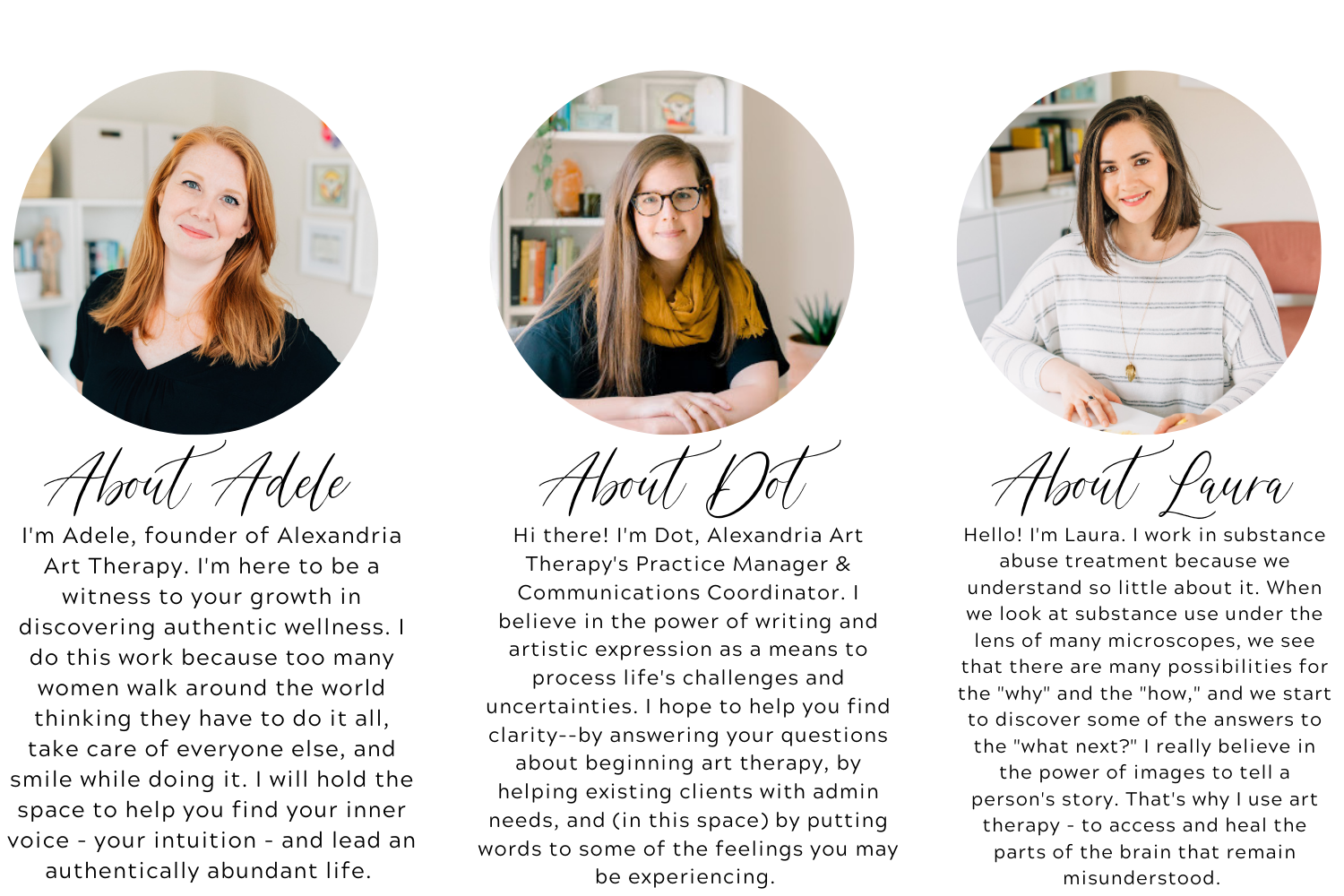Emergence: The Space is the Same, But I'm Not
DOT DANNENBERG: Several times throughout the pandemic, I’ve seen quarantine compared to a cocoon. We’re hiding out, and when we emerge, we will be beautiful! Though I’m especially fond of Sam Anderson’s essay, in which he points out that when a caterpillar turns into a butterfly, its organs literally melt down, I’d venture to say that for a lot of people, maybe the Brood X cicadas are a better metaphor.
LAURA MILES: There’s a phenomenon I’ve noticed personally and professionally--the world seems to have stopped, but we kept growing. There’s this emergence we’re experiencing now that makes me think of the cicadas we’ve been seeing around the DC area, for sure.
DOT: Seventeen years underground, and then they’re everywhere. I read that while they’re underground, they feed on the sap from grass and tree roots. It takes them all that time to transform from their nymphal stage into their adult forms. Then they emerge and start screaming for a mate.
ADELE STUCKEY: It’s like we have come out of our homes into the same environment as before, but like the cicadas, we are completely different. The promise of permanent telework is changing. We get back to our desks, and it’s like a time capsule of March 2020. The space is the same, but I’m not. We’re asking questions like--what am I supposed to wear? How am I going to commute 3 hours a day again? What do I even talk about when I see another human? I feel like I’ve changed so much.
DOT: Growth and transformation still happen during seasons of waiting. Even when it feels like nothing is happening or everything is stagnating in your life, you are still growing. You are changing. This growth isn’t always positive, but it is a further evolution of who you will be in your life. Whether we would have chosen it or not, we have departed our nymphal stage. We’ve seen some stuff now.
ADELE: The past 15 months have changed us. And we’ve changed in the past 15 months, pandemic aside. Think about what any given person goes through in almost a year and a half. Births, deaths, moves, divorces, marriages, graduations, job changes, identity explorations...You’re not alone if wrapping your head around what has happened over the past year is confusing. Change has been happening even when your day-to-day feels like Groundhog’s Day. How are we supposed to explain how we’ve changed over the past year? We hunkered down and feel like we’re emerging as new people. Maybe you feel like your friends, colleagues, or family members don’t know the real you anymore.
LAURA: And even if what happened to you wasn’t a monumental shift on a personal level, let’s not forget that you survived one of the most uncomfortable things any of us have been through. Your participation in a global event is not any less significant because it wasn’t accompanied by a “normal” life event.
DOT: For the long months of the pandemic, we were growing in that we were learning new things about ourselves: the boundaries of our resilience, our capacity for enduring trauma, how to love and lose and lose again, what values rise to the surface when ease and (dare I say?) happiness is stripped away. There’s all of this growth and change, and now comes “hot girl summer.”
LAURA: Vax summer.
ADELE: People are getting vaccinated. Mask mandates are lifting. Stay at home orders have been long gone in this country. Many spaces of the U.S. are reopening, including offices.
DOT: The bars are full. The dating apps are swiping.
LAURA: Just as bad as they’ve always been, except now with more urgency...
DOT: True! The cicadas have emerged from the ground and are screaming for companionship. In a way, this bug-like “tomorrow we die” energy makes a lot of sense. “I’ve been cooped up and now I want to party” may not seem like it has a lot of nuance, but we’ve also been given a peek behind the curtain this year. We’ve grappled with our mortality, perhaps for the first time. We see how fleeting it all is. It makes sense if you feel this urgent need to get out of your house and into the world, and maybe treat some of your trauma with a little adrenaline. But here’s where most of us differ from the cicadas: you probably don’t have just six weeks to live. And you’re likely not on a singular mission to reproduce. The human experience is not a program. It’s complicated.
LAURA: You are not a cicada. Your emergence back into the world doesn’t have to be this wild, intense scream-fest. Actually, there’s plenty of space for screaming, if you want, but you don’t have to rush anything. You have time.
DOT: Ha! I love that. Has anyone called the primal scream line? I’ve been tempted. I guess it’s just good to hear some permission to take my time. I’ve been halfheartedly joking to friends and family that I sort of feel like a shell of a person. (Maybe that’s the real cicada metaphor: I’m the crunchy part they leave behind on the tree.) But it’s kind of like a hint to people--hey, I’m not the same person at all.
LAURA: I won’t lie--I am extremely suspicious of anyone who says they stayed exactly the same through this year. I don’t have to be your therapist to call BS on that.
ADELE: I think that’s such a common experience, now. There are many reasons why we would feel like even those closest to us don’t know who we have become and how we’ve changed. Maybe you’ve experienced loss or hard transitions and didn’t know how to talk about it. Or maybe sharing significant news over a Zoom call just didn’t feel right. In the socially-distant world, we put our heads down and isolated because, quite frankly, it was just the safest thing to do. That isolation may have been a mixture of a trauma response (freeze, hide out) and the realistic nature of what was most safe when so much was unknown with the pandemic.
DOT: It’s like a double-whammy--we went into isolation because of something traumatizing, but then the isolation is also a traumatizing experience in and of itself.
LAURA: Not to mention that, even if you’ve found ways of sharing updates regularly with your support system, there’s nothing that can replicate the experience of being in the same space with them. They might know something new or different about you, but they haven’t seen you embody it yet, and that can feel like sharing it all over again.
DOT: A friend of mine just wrote a wonderful essay about taking her toddler out to lunch for the first time--in it, she talks about how it feels to be “seen” with your child after parenting in isolation. That’s been huge for me, and for a lot of people, but it’s hard to explain to others. Like--I have been a mom for over a year and half now, but in a lot of ways I have no idea what to do. I created a life, but I’ve also felt really empty. It’s not what people expect to talk about when they meet my kid for the first time.
ADELE: It’s hard to know how to talk about the big stuff that happened in our lives while also balancing feelings of excitement to see people in person again. You might be thinking, I don’t want to be a downer.
LAURA: I remember last year, perhaps around May (but really, what does time mean?) when I thought “What did we talk about before we talked about COVID?” And now, another year after that, I still have no idea.
DOT: There’s a tweet I saw--I think, Laura, you actually shared it--that was talking about how to balance your feelings of trying to process the last year while capitalist America is screaming “AMERICA IS OPEN!!!”
LAURA: Which I think is also a testament to the fact that while so many things have changed, nothing has changed. We had the perfect opportunity to reshape parts of society that weren’t working or maybe never did, and we just...forgot? Got distracted? I, for one, am trying to find small ways that I’m not buying into the old mindset anymore.
ADELE: I think the important thing to remember comes back to that place of human complexity: we can be feeling both. You can hold within yourself the duality of excitement to be back in the world with the sense that part of yourself has been hollowed out. And also remembering that even the people who seem to have cast off the pandemic’s shackles the quickest still lived through the collective year that you did. Everyone has been affected in some way.
DOT: Everyone’s emergence process will look a little different. And it’s worth remembering that not all the cicadas emerged on the same day. There were billions of them, and they emerged over a period of weeks. When it comes to re-entering the world after the pandemic, being a straggler is fine, too.


